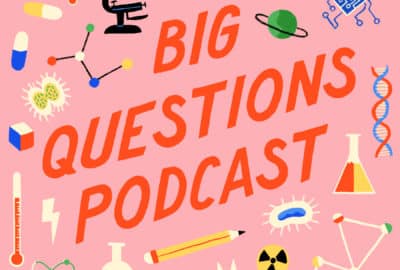Can my gut health improve my mental health?
Wednesday 8th Mar 2023, 12.30pm
Our gut microbiome (that’s all the microorganisms – such as bacteria, viruses and fungi – living in our gut) is really important for healthy digestion. But did you know that it’s also linked to our mental health? In this episode of the Big Questions Podcast we chat to neuroscientist Prof Philip Burnet from Oxford’s Department of Psychiatry about how our gut is connected to our brain, and how taking prebiotic and probiotic supplements could even help in the treatment of mood and psychotic disorders.
Emily Elias: Don’t underestimate the power of your guts. They’re not just there to digest food and give us energy, there is a whole world in our stomachs that can affect how we feel. On this episode of the Oxford Sparks Big Questions podcast, we’re asking, can my gut health improve my mental health?
Hello, I’m Emily Elias, and this is the show where we seek out the brightest minds at the University of Oxford, and we ask them the big questions. And for this one, we have found a researcher who’s all about that gut feeling.
Dr Philip Burnet: So, my name is Philip Burnet. I’m a basic neuroscientist in the Department of Psychiatry, University of Oxford. And I’m interested in how gut microbes affect brain function.
Emily: Okay. I am not a gut scientist. Can you help me out here? What is a microbiome?
Philip: So, the microbiome is really a term that refers to all the microorganisms in the gut. So, it’s not just bacteria, as some people believe. It includes viruses, fungi, yeasts, and so on.
Emily: So, they’re all just living in there, having a nice time?
Philip: Yes, they’re all living with us. And they even help us digest some of the foods we can’t digest. So, for example, there are some plant chemicals that we can’t actually break down, the so-called dietary fibres, which the bacteria within our gut microbiome can help us do.
From these, they also make compounds that benefit us. For example, they can make vitamin K, which we can’t.
Emily: Okay, so, how could it be affecting my brain? Or your area of research that you look into, in psychology?
Philip: Yes, that’s an interesting question. So, there’s three ways through which the gut and the gut microbiome can affect brain function. There’s the immune system. There’s compounds that are generated by the gut microbes fermenting our food. And there’s also a nerve that connects from the brain to the gut.
So, firstly, the immune system. The gut is the seat of our immunity. So, whenever we have an infection, the gut really helps recruit the necessary immune cells and molecules that fight infections.
Now, one set of molecules, called cytokines, can actually travel to the brain and start immune signals within the brain, which connect with neurotransmitters. So, for example, if we did have an infection, some of these cytokines could travel to the brain, initiate or start a signal that changes our neurotransmitters, and it might even lead to a change in our mood. So, that’s the immune system, where the gut regulates our immunity, but with the gut microbes within, they can modulate that function, they can change and influence that function.
The next way where gut bacteria can affect the brain, and the gut communicates with the brain, is through the actual compounds that arise from our digestion of food. So, bacteria can digest or ferment some of the food we digest, to produce compounds called metabolites. And these also can travel to the brain, where they can influence the function of neurotransmitters.
A lot of these metabolites are absorbed by the gut. So, it’s not just the compounds the bacteria produce. The food itself we eat causes the release of gut hormones, which regulates our appetite. These hormones travel in the blood, and can regulate brain function. And of course, if the gut bacteria influencing the way our food is broken down, then they’ll also influence how these gut hormones are secreted.
But then changes in the physiology of the gut can feed back to the brain through a nerve called the vagus nerve. So, that’s the third way the gut can communicate with the brain. It’s the so-called hardwired route. And this is really- through this nerve is how we feel pain when we have problems, with bowel problems, and so on.
Emily: So, there’s a lot more going on that just my stomach saying, “I’m hungry”. What exactly have you been studying?
Philip: We went a bit beyond the connection with food. We wanted to know whether manipulating or changing the gut bacteria, particularly the gut bacteria, can affect or improve mood, and even the way people think. So, our first study really showed that when we gave to people either with an illness, psychiatric illness, or healthy volunteers, something that changed their gut bacteria, there were certain changes in their behaviour.
Now, initially, our studies started with prebiotics. Now, prebiotics are so-called dietary fibres, and you can actually buy supplements called prebiotics. So, these are short sugar chains, if you like.
Emily: I feel like I know them from yoghurt campaigns. Like, either Jamie Lee Curtis in the States, or Davina McCall in this country, trying to sell me some yoghurt that is going to be loaded with probiotics, and it’s going to make me poo better.
Philip: (Laughter) Yes, they probably are. So, just to clarify, the prebiotics are these dietary fibres, these short chains of sugars which the bacteria feed on, and produce the metabolites we were discussing before. And that could benefit our whole body, not just the brain.
The other ones, the other type, is the probiotics. Now, that’s the most common thing you find in yoghurts, and so on. And these are live cultures of good bacteria. And they’re called ‘good bacteria’ because when they’re ingested, they do actually benefit the whole metabolic processes of the person.
So, usually, you find in yoghurts probiotics. So, things like bifida bacteria, lactobacilli. And prebiotics can also be in dairy produce, but usually you find them as supplements. And of course, naturally in high-fibre diets.
Emily: And so, are those types of things what your study looked at, how prebiotics and probiotics change our moods?
Philip: Yes, certainly, with the prebiotics which we studied, we were most interested in first-episode psychosis and schizophrenia. Now, in this illness, people have hallucinations and delusions, this psychosis, which some of the people respond to medications, such as antipsychotics.
However, most people who have psychosis, or repeated episodes of psychosis, as is the case in schizophrenia, they also have a thought disorder. So, they can’t always problem-solve, or comfortably or successfully work in an environment. So, you usually find that people with schizophrenia can’t hold down jobs or keep stable relationships.
So, these are the so-called cognitive deficits. A lot of people with psychosis have cognitive deficits which can’t be treated by current medication. So, we wanted to see if manipulating or changing or feeding the gut microbiome – well, particularly the gut bacteria – with prebiotics, improve their thought processes or cognitive processes.
And we did a short study with people with psychosis, and we did find that when they took a prebiotic for about 12 weeks, their cognitive function, their thoughts, problem-solving and so on, improved. So, that showed that nurturing our gut bacteria does have benefits to the brain, even in extreme conditions, such as psychosis.
And I should add, these people were not hallucinating, they didn’t have psychosis at the time of the study, because they were already on medication. But they did have this problem with their cognition.
Emily: And so, then what happened when you looked at probiotics?
Philip: So, with probiotics, we looked at a different set of people. We looked at people with moderate depression. And the reason for that is a lot of this field started with probiotics and mood, particularly in animals. So, we wanted to know what probiotics actually did to mood in people.
And the reason why we chose people with moderate depression, according to clinical scales that GPs use, is because these people won’t necessarily have medication. In fact, that was one of the requisites of the study, that they weren’t on antidepressant medication.
And what we found was that indeed, after four weeks of taking a commercial probiotic supplement daily, their mood improved. Now, our initial interest was looking at the psychological pathways that underlie mood, and we did find that when people did computer tasks, their psychological problem-solving, if you like, or solving of psychological tasks, was different compared with people with a placebo onboard.
Emily: Both of these studies sound like amazing results. Do you have any guests as to why you’re seeing this?
Philip: That is an interesting question, and something we still need to find out. We’ve been looking into the three ways gut bacteria, or the probiotics and prebiotics influencing the gut bacteria, can communicate with the brain. With the two human studies, with the psychosis and depression study, we didn’t really find any changes in immune molecules. So, in that instance, we ruled this out. But of course, they were small studies.
So, we maybe think that what is happening is either the gut bacteria are communicating with the brain by improving overall metabolism, metabolic health of these people, which then of course, the brain benefits from, because it’s fed better, more efficiently, and so on. Or it is solely through this vagus nerve, that the gut bacteria produces compounds which influences the hardwired connection between the gut and the brain. These things we still have to look into.
Emily: Still, it is significant. I mean, what could this mean for people who are dealing with mental health issues?
Philip: I think obviously, the first thing to say is that these prebiotics and probiotics we’re talking about are not a replacement for drugs. Obviously, with mental health issues, people need to contact a health professional and get some advice on treatment, and so on.
What I would say, though, is that there are people who are reluctant to seek medical advice, and perhaps in the first instance, particularly with people with moderate depression or mild depression, they maybe could try taking a probiotic to see if their mood improves, and perhaps by getting used to taking something, a supplement, daily, they would find the courage, if you like, or for want of a better word, find that they would like to talk to a health professional, and to see if they needed any additional thing.
But the take-home message is that the medication, the drugs, the psychotherapy, are here to stay. This is so important for psychiatric issues, mental health disorders. But probiotics and prebiotics may be able to help with these medications.
So, for example, with our schizophrenia study, as I said, these people were on medication, and when we gave the prebiotic, it helped the cognitive function, which the medication couldn’t alter. So, I think taking pre- and probiotics will be beneficial with medication, rather than on their own.
Emily: Well, I’m definitely going to think twice about what is going on with my guts.
Philip: (Laughter) It’s always worth looking after your gut to feel happy.
Emily: This podcast was brought to you by Oxford Sparks from the University of Oxford. With music by John Lyons, and a special thanks to Philip Burnet.
Tell us what you think of this podcast. You can find us on social media. We are @oxfordsparks, or you can find us on Facebook. We’re there too, just search Oxford Sparks. Or go to our website: oxfordsparks.ox.ac.uk.
I’m Emily Elias. Bye for now.
Transcribed by UK Transcription.





